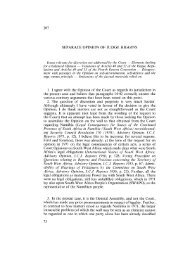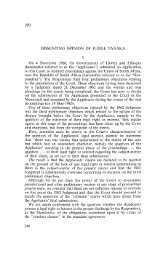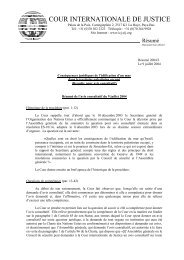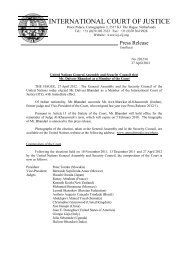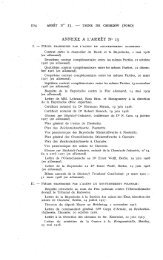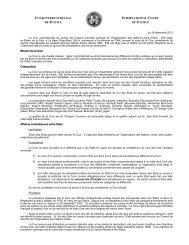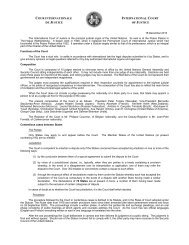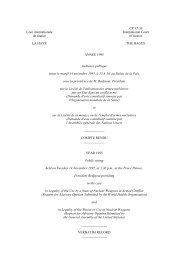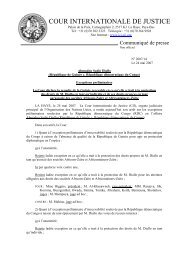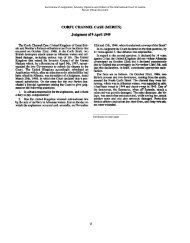C. Regional instruments in the context of the former Yugoslavia
C. Regional instruments in the context of the former Yugoslavia
C. Regional instruments in the context of the former Yugoslavia
Create successful ePaper yourself
Turn your PDF publications into a flip-book with our unique Google optimized e-Paper software.
C. <strong>Regional</strong> <strong><strong>in</strong>struments</strong> <strong>in</strong> <strong>the</strong> <strong>context</strong> <strong>of</strong> <strong>the</strong> <strong>former</strong> <strong>Yugoslavia</strong>
UNITED<br />
NATIONS<br />
232<br />
A<br />
General Assembly<br />
Distr.<br />
GENERAL<br />
A/46/804<br />
18 December 1991<br />
ENGLISH<br />
ORIGINAL» ENGLISH/FRENCH<br />
Forty-sixth session<br />
Agenda item 68<br />
REVIEW OF THE IMPLEMENTATION OF THE DECLARATION ON THE<br />
STRENGTHENING OF INTERNATIONAL SECURITY<br />
Letter dated 17 December 1991 from <strong>the</strong> Permanent Representative<br />
<strong>of</strong> <strong>the</strong> Ne<strong>the</strong>rlands to <strong>the</strong> United Nations addressed to <strong>the</strong><br />
Secretary-General<br />
I have <strong>the</strong> honour to transmit <strong>the</strong> text, <strong>in</strong> English and French, <strong>of</strong> a<br />
Declaration <strong>of</strong> <strong>the</strong> European Council on <strong>the</strong> "Guidel<strong>in</strong>es on <strong>the</strong> Recognition <strong>of</strong><br />
New States <strong>in</strong> Eastern Europe and <strong>in</strong> <strong>the</strong> Soviet Union", issued on<br />
16 December 1991 (see annex).<br />
I should be grateful if you would have <strong>the</strong> text <strong>of</strong> <strong>the</strong> present letter and<br />
its annex circulated as a document <strong>of</strong> <strong>the</strong> General Assembly under agenda<br />
item 68.<br />
(Signed) Robert J. VAN SCHAIK<br />
Ambassador<br />
Permanent Representative<br />
91-49957 2843h (E) /. . .
A/46/804<br />
English<br />
Page 2<br />
ANNEX<br />
Declaration <strong>of</strong> <strong>the</strong> European Council on <strong>the</strong> Guidel<strong>in</strong>es on <strong>the</strong><br />
Recognition <strong>of</strong> New States <strong>in</strong> Eaatern Europe and <strong>in</strong> <strong>the</strong><br />
Soviet Union, issued on 16 December 1991<br />
In compliance with <strong>the</strong> European Council's request. M<strong>in</strong>isters have<br />
assessed developments <strong>in</strong> Eastern Europe and <strong>in</strong> <strong>the</strong> Soviet Union with a view co<br />
elaborat<strong>in</strong>g an approach regard<strong>in</strong>g relations with new States.<br />
In this connection <strong>the</strong>y have adopted <strong>the</strong> follow<strong>in</strong>g guidel<strong>in</strong>es on <strong>the</strong><br />
formal recognition <strong>of</strong> uew States <strong>in</strong> Eastern Europe and <strong>in</strong> <strong>the</strong> Soviet Union:<br />
"The Community and its member States confirm <strong>the</strong>ir attachment to <strong>the</strong><br />
pr<strong>in</strong>ciples <strong>of</strong> <strong>the</strong> Hels<strong>in</strong>ki F<strong>in</strong>al Act and <strong>the</strong> Charter <strong>of</strong> Paris, <strong>in</strong><br />
particular <strong>the</strong> pr<strong>in</strong>ciple <strong>of</strong> self-determ<strong>in</strong>ation. They affirm <strong>the</strong>ir<br />
read<strong>in</strong>ess to recognise, subject to th« normal standards <strong>of</strong> <strong>in</strong>ternational<br />
practice and <strong>the</strong> political realities <strong>in</strong> each case, those new States<br />
which, follow<strong>in</strong>g <strong>the</strong> historic changes <strong>in</strong> <strong>the</strong> region, have constituted<br />
<strong>the</strong>mselves on a democratic basis, have accepted <strong>the</strong> appropriate<br />
<strong>in</strong>ternational obligations and have committed <strong>the</strong>mselves <strong>in</strong> good faith to<br />
a peaceful process and to negotiations.<br />
Therefore, <strong>the</strong>y adopt a common position on <strong>the</strong> process <strong>of</strong><br />
recognition <strong>of</strong> <strong>the</strong>se new States, which requirest<br />
Respect for <strong>the</strong> provisions <strong>of</strong> <strong>the</strong> Charter <strong>of</strong> <strong>the</strong> United Nations and <strong>the</strong><br />
commitments subscribed to <strong>in</strong> <strong>the</strong> F<strong>in</strong>al Act <strong>of</strong> Hels<strong>in</strong>ki and <strong>in</strong> <strong>the</strong> Charter<br />
<strong>of</strong> Paris, especially with regard to <strong>the</strong> rule <strong>of</strong> law, democracy and human<br />
rights;<br />
Guarantees for <strong>the</strong> rights o£ ethnic and national groups and m<strong>in</strong>orities <strong>in</strong><br />
accordance with <strong>the</strong> commitments subscribed to <strong>in</strong> <strong>the</strong> framework <strong>of</strong> <strong>the</strong><br />
CSCE;<br />
Respect for <strong>the</strong> <strong>in</strong>violability <strong>of</strong> all frontiers which can only be changed<br />
by peaceful means and by common agreement;<br />
Acceptance <strong>of</strong> all relevant commitments with regard to disarmament and<br />
nuclear non-proliferation as well as to security and regional stability;<br />
Commitment to settle by agreement, <strong>in</strong>clud<strong>in</strong>g where appropriate by<br />
recourse to arbitration, all questions concern<strong>in</strong>g State succession and<br />
regional disputes.<br />
The Community and it3 member States will not recognize entities<br />
which are <strong>the</strong> result <strong>of</strong> aggression. They would take account <strong>of</strong> <strong>the</strong><br />
effects <strong>of</strong> recognition on neighbour<strong>in</strong>g States.<br />
/...
DRTS<br />
VW CASES<br />
illiams, K.C.,<br />
INTERNATIONAL<br />
LAW REPORTS<br />
233<br />
,C.B.E.,LL.D.,<br />
).<br />
Volume<br />
92<br />
i.C.,LL.D.,F.B.A.<br />
t:<br />
.PORTS<br />
EDITED<br />
BY<br />
E. LAUTERPACHT, C.B.E., Q.C.<br />
BENCHER OF GRAY'S INN;<br />
FELLOW OF TRINITY COLLEGE. CAMBRIDGE<br />
AND<br />
C.J. GREENWOOD<br />
FELLOW OF MAGDALENE COLLEGE, CAMBRIDGE<br />
terpacht, Q.C., LL.D.<br />
iterpacht, Q.C., LL.D.,<br />
acht<br />
Q.C.<br />
to Vols. 1—35 and 36—45<br />
,QC<br />
dated Tables <strong>of</strong> Cases and<br />
,C.B.E.,aC,<br />
A PUBLICATION OF<br />
THE RESEARCH CENTRE FOR INTERNATIONAL LAW,<br />
UNIVERSITY OF CAMBRIDGE<br />
CAMBRIDGE<br />
GROTIUS PUBLICATIONS LIMITED<br />
1993
162 CONFERENCE ON YUGOSLAVIA (ARBITRATION COMM.)<br />
Recognition—States—Effects <strong>of</strong> recognition—Whe<strong>the</strong>r constitutive<br />
or declaratory — Conditions for recognition — Break up <strong>of</strong><br />
exist<strong>in</strong>g State — <strong>Yugoslavia</strong><br />
States — Criteria for statehood — Territory and population<br />
subject to an organized political authority — Federal State —<br />
Whe<strong>the</strong>r requirement that federal organs represent components<br />
<strong>of</strong> federation and wield effective power — <strong>Yugoslavia</strong> — Whe<strong>the</strong>r<br />
Socialist Federal Republic <strong>of</strong> <strong>Yugoslavia</strong> ceased to fulfil <strong>the</strong>se<br />
conditions by December 1991—Whe<strong>the</strong>r <strong>in</strong> process <strong>of</strong> dissolution<br />
State succession — Pr<strong>in</strong>ciples — Vienna Convention on State<br />
Succession <strong>in</strong> Respect <strong>of</strong> Treaties, 1978 — Vienna Convention on<br />
State Succession <strong>in</strong> Respect <strong>of</strong> State Property, Archives and<br />
Debts, 1983 — Whe<strong>the</strong>r reflect<strong>in</strong>g customary <strong>in</strong>ternational law<br />
— Outcome <strong>of</strong> succession to be achieved by negotiation on<br />
equitable basis — <strong>Yugoslavia</strong> — Whe<strong>the</strong>r Socialist Federal<br />
Republic <strong>of</strong> <strong>Yugoslavia</strong> <strong>in</strong> process <strong>of</strong> dissolution by December<br />
1991 — Declarations <strong>of</strong> <strong>in</strong>dependence by certa<strong>in</strong> Yugoslav<br />
Republics — Whe<strong>the</strong>r constitut<strong>in</strong>g secession — Whe<strong>the</strong>r any<br />
Republics or group <strong>of</strong> Republics cqnstitute cont<strong>in</strong>uation <strong>of</strong><br />
Socialist Federal Republic <strong>of</strong> <strong>Yugoslavia</strong> '<br />
OPINION NO. 1<br />
Conference on <strong>Yugoslavia</strong>, Arbitration Commission. 29 November 1991<br />
(Bad<strong>in</strong>ter, Chairman; Corasaniti, Herzog, Petry, and Tomas y<br />
Valiente, Members)<br />
SUMMARY: Thefacts:—Dur<strong>in</strong>g <strong>the</strong> summer <strong>of</strong> 1991, hostilities broke out <strong>in</strong><br />
<strong>the</strong> Socialist Federal Republic <strong>of</strong> <strong>Yugoslavia</strong> (<strong>the</strong> "SFRY") follow<strong>in</strong>g <strong>the</strong><br />
declaration <strong>of</strong> <strong>in</strong>dependence by some <strong>of</strong> <strong>the</strong> six Republics which constituted<br />
<strong>the</strong> SFRY. 1 In a Declaration issued on 27 August 1991, <strong>the</strong> European<br />
Community and its Member States, act<strong>in</strong>g with<strong>in</strong> <strong>the</strong> framework <strong>of</strong><br />
European Political Co-operation,- announced that <strong>the</strong>y were conven<strong>in</strong>g a<br />
peace conference ("<strong>the</strong> Conference on <strong>Yugoslavia</strong>") which would br<strong>in</strong>g<br />
toge<strong>the</strong>r <strong>the</strong> Federal Presidency and Federal Government <strong>of</strong> <strong>Yugoslavia</strong>, <strong>the</strong><br />
Presidents <strong>of</strong> <strong>the</strong> six Republics and representatives <strong>of</strong> <strong>the</strong> European<br />
Community and its Member States. The Declaration stated that an<br />
arbitration procedure would be established <strong>in</strong> <strong>the</strong> framework <strong>of</strong> <strong>the</strong><br />
Conference and provided that:<br />
The relevant authorities will submit <strong>the</strong>ir differences to an Arbitration<br />
Commission <strong>of</strong> fivemembers chosen from <strong>the</strong> Presidents <strong>of</strong> Constitutional<br />
1 The six Republics were Bosnia-Hercegov<strong>in</strong>a, Croatia, Macedonia, Montenegro, Serbia<br />
and Slovenia.<br />
t<br />
OPINION<br />
No. 1 163<br />
Courts exist<strong>in</strong>g <strong>in</strong> Community countries. The composition <strong>of</strong> <strong>the</strong><br />
Arbitration Commission will be:<br />
—two members appo<strong>in</strong>ted unanimously by <strong>the</strong> Federal Presidency;<br />
—three members appo<strong>in</strong>ted by <strong>the</strong> Community and its Member States.<br />
In <strong>the</strong> absence <strong>of</strong> agreement on <strong>the</strong> members to be appo<strong>in</strong>ted by <strong>the</strong><br />
Federal Presidency, <strong>the</strong>y will be designated by <strong>the</strong> three members<br />
appo<strong>in</strong>ted by <strong>the</strong> Community.<br />
This Arbitration Commission will give its decision with<strong>in</strong> two months. 2<br />
A second Declaration, issued on 3 September 1991, stated that:<br />
In <strong>the</strong> framework <strong>of</strong> <strong>the</strong> Conference, <strong>the</strong> Chairman will transmit to <strong>the</strong><br />
Arbitration Commission <strong>the</strong> issues submitted for arbitration, and <strong>the</strong><br />
results <strong>of</strong> <strong>the</strong> Commission's deliberations will be put back to <strong>the</strong><br />
Conference through <strong>the</strong> Chairman. The rules <strong>of</strong> procedure for <strong>the</strong><br />
arbitration will be established by <strong>the</strong> Arbitrators, after tak<strong>in</strong>g <strong>in</strong>to account<br />
exist<strong>in</strong>g organizations <strong>in</strong> <strong>the</strong> field. 3<br />
At <strong>the</strong> open<strong>in</strong>g <strong>of</strong> <strong>the</strong> Conference on 7 September 1991 <strong>the</strong> representatives<br />
<strong>of</strong> <strong>the</strong> six Republics accepted <strong>the</strong>se arrangements.'*<br />
On 20 November 1991 <strong>the</strong> Chairman <strong>of</strong> <strong>the</strong> Conference wrote to <strong>the</strong><br />
Chairman <strong>of</strong> <strong>the</strong> Arbitration Commission, request<strong>in</strong>g <strong>the</strong> Commission to<br />
consider whe<strong>the</strong>r those Republics which had declared <strong>the</strong>mselves <strong>in</strong>dependent<br />
(or which had <strong>in</strong>dicated that <strong>the</strong>y would do so) had seceded from <strong>the</strong> SFRY or<br />
whe<strong>the</strong>r <strong>the</strong> SFRY had dis<strong>in</strong>tegrated, so that all six Republics were to be<br />
considered equal successors to <strong>the</strong> SFRY, without any <strong>of</strong> <strong>the</strong>m, or any group <strong>of</strong><br />
<strong>the</strong>m, be<strong>in</strong>g able to claim to be <strong>the</strong> cont<strong>in</strong>uation <strong>of</strong> <strong>the</strong> SFRY.<br />
Held:—The SFRY was <strong>in</strong> <strong>the</strong> process <strong>of</strong> dissolution and it was <strong>in</strong>cumbent on<br />
<strong>the</strong> six Republics to settle such problems <strong>of</strong> State succession as may arise<br />
from this process <strong>in</strong> keep<strong>in</strong>g with <strong>the</strong> pr<strong>in</strong>ciples and rules <strong>of</strong> <strong>in</strong>ternational<br />
law, with particular regard for human rights and <strong>the</strong> rights <strong>of</strong> peoples and<br />
m<strong>in</strong>orities. It was up to those Republics which so wished to work toge<strong>the</strong>r to<br />
form a new association endowed with <strong>the</strong> democratic <strong>in</strong>stitutions <strong>of</strong> <strong>the</strong>ir<br />
choice.<br />
(1) The Commission's answer to <strong>the</strong> question put had to be based upon<br />
<strong>the</strong> .pr<strong>in</strong>ciples <strong>of</strong> public <strong>in</strong>ternational law which denned <strong>the</strong> conditions on<br />
which an entity constituted a State. The existence or disappearance <strong>of</strong> a State<br />
was a question <strong>of</strong> fact; <strong>the</strong> effects <strong>of</strong> recognition by o<strong>the</strong>r States were purely<br />
(2) A State was a community which consisted <strong>of</strong> a territory and a<br />
population subject to an organized political authority and was characterized<br />
1<br />
Declaration on <strong>Yugoslavia</strong> itsued by European Political Co-operation Procedure<br />
Extraord<strong>in</strong>ary M<strong>in</strong>isterial Meet<strong>in</strong>g <strong>in</strong> Brussels on 27 August 1991. The full text will be<br />
reproduced <strong>in</strong> D. Bethlehem and M. Weller, The Yugoslav Crisis, (to be published by Grotius<br />
Publications <strong>in</strong> <strong>the</strong> Cambridge International Documents Series).<br />
1<br />
Declaration on <strong>Yugoslavia</strong> issued by European Political Co-operation Procedure<br />
Extraord<strong>in</strong>ary M<strong>in</strong>isterial Meet<strong>in</strong>g <strong>in</strong> The Hague on 3 September 1991. The full text will be<br />
published <strong>in</strong> D. Bethlehem and M. Weller, op. cit. n. 2 above.<br />
* For discussion <strong>of</strong> <strong>the</strong> status and competence <strong>of</strong> <strong>the</strong> Arbitration Commission, see Inttrlocutoiy<br />
Decision (Op<strong>in</strong>ions 8, 9 and 10) at p. 194 el seq.
164 CONFERENCE ON YUGOSLAVIA (ARBITRATION COMM.)<br />
by sovereignty. The <strong>in</strong>ternal political organization and constitutional<br />
provisions adopted were mere facts but had to be taken <strong>in</strong>to account <strong>in</strong><br />
determ<strong>in</strong><strong>in</strong>g <strong>the</strong> Government's sway over <strong>the</strong> territory and population.<br />
(3) In a federal State, <strong>the</strong> existence <strong>of</strong> <strong>the</strong> State implied that <strong>the</strong> federal<br />
organs represented <strong>the</strong> components <strong>of</strong> <strong>the</strong> federation and wielded effective<br />
power. In <strong>the</strong> case <strong>of</strong> <strong>the</strong> SFRY, <strong>the</strong> essential federal organs no longer met <strong>the</strong><br />
criteria <strong>of</strong> participation and representativeness <strong>in</strong>herent <strong>in</strong> a federal State.<br />
(4) State succession meant <strong>the</strong> replacement <strong>of</strong> one State by ano<strong>the</strong>r <strong>in</strong> <strong>the</strong><br />
responsibility for <strong>the</strong> <strong>in</strong>ternational relations <strong>of</strong> <strong>the</strong> territory concerned. It was<br />
governed by <strong>the</strong> pr<strong>in</strong>ciples <strong>of</strong> <strong>in</strong>ternational law from which <strong>the</strong> Vienna<br />
Convention on State Succession <strong>in</strong> Respect <strong>of</strong> Treaties, 1978, and <strong>the</strong><br />
Vienna Convention on State Succession <strong>in</strong> Respect <strong>of</strong> State Property,<br />
Archives and Debts, 1983, drew <strong>the</strong>ir <strong>in</strong>spiration. The outcome <strong>of</strong> succession<br />
should be achieved by negotiation between <strong>the</strong> States concerned on an<br />
equitable basis. The peremptory norms <strong>of</strong> <strong>in</strong>ternational law, <strong>in</strong> particular<br />
those concern<strong>in</strong>g respect for human rights and <strong>the</strong> rights <strong>of</strong> peoples and<br />
m<strong>in</strong>orities, were b<strong>in</strong>d<strong>in</strong>g on all <strong>the</strong> parties to <strong>the</strong> succession.<br />
The follow<strong>in</strong>g is <strong>the</strong> text <strong>of</strong> <strong>the</strong> op<strong>in</strong>ion <strong>of</strong> <strong>the</strong> Arbitration<br />
Commission:<br />
The Chairman <strong>of</strong> <strong>the</strong> Arbitration Commission received <strong>the</strong> follow<strong>in</strong>g<br />
letter from Lord Carr<strong>in</strong>gton, Chairman' <strong>of</strong> <strong>the</strong> Conference on<br />
<strong>Yugoslavia</strong>, on 20 November 1991:<br />
We f<strong>in</strong>d ourselves with a major legal question.<br />
Serbia considers that those Republics which have, declared or would<br />
declare <strong>the</strong>mselves <strong>in</strong>dependent or sovereign have seceded or would secede<br />
from <strong>the</strong> SPRY whkjh wj3uld_o<strong>the</strong>rwise cont<strong>in</strong>ue to exist.<br />
O<strong>the</strong>r Republics on <strong>the</strong> contrary consider that tKêre is no question <strong>of</strong><br />
seccession, but <strong>the</strong> question is one <strong>of</strong> a dis<strong>in</strong>tegration or brèak<strong>in</strong>g-up <strong>of</strong> <strong>the</strong><br />
SFRY as <strong>the</strong> result <strong>of</strong> <strong>the</strong> concurr<strong>in</strong>g will <strong>of</strong> a number <strong>of</strong> Republics. They<br />
consider that <strong>the</strong> six Republics are to be considered equal successors to <strong>the</strong><br />
SFRY, without any <strong>of</strong> <strong>the</strong>m or group <strong>of</strong> <strong>the</strong>m be<strong>in</strong>g able to claim to be <strong>the</strong><br />
cont<strong>in</strong>uation <strong>the</strong>re<strong>of</strong>.<br />
I should like <strong>the</strong> Arbitration Committee to consider die matter <strong>in</strong> order to<br />
formulate any op<strong>in</strong>ion or recommendation which it might deem useful.<br />
The Arbitration Commission has been apprised <strong>of</strong> <strong>the</strong> memoranda<br />
and documents communicated respectively by <strong>the</strong> Republics <strong>of</strong><br />
Bosnia and Hercegov<strong>in</strong>a, Croatia, Macedonia, Montenegro,<br />
Slovenia, Serbia, and by <strong>the</strong> President <strong>of</strong> <strong>the</strong> collegiate Presidency <strong>of</strong><br />
<strong>the</strong> SFRY.<br />
1. The Commission considers:<br />
(a) that <strong>the</strong> answer to <strong>the</strong> question should be based on <strong>the</strong> pr<strong>in</strong>ciples<br />
<strong>of</strong> public <strong>in</strong>ternational law which serve to def<strong>in</strong>e <strong>the</strong> conditions on<br />
which án entity constitutes a State; that <strong>in</strong> this respect, <strong>the</strong> existence or<br />
OPINION No. 1 165<br />
disappearance <strong>of</strong> <strong>the</strong> State is a question <strong>of</strong> fact; that <strong>the</strong> effects <strong>of</strong><br />
recognition by o<strong>the</strong>r States are purely declaratory;<br />
(b) that <strong>the</strong> State is commonly def<strong>in</strong>ed as a community which<br />
consists <strong>of</strong> a territory and a population subject to an organized political<br />
authority; that such a State is characterized by sovereignty;<br />
(c) that, for <strong>the</strong> purpose <strong>of</strong> apply<strong>in</strong>g <strong>the</strong>se criteria, <strong>the</strong> form <strong>of</strong><br />
<strong>in</strong>ternal political organization and <strong>the</strong> constitutional provisions are<br />
mere facts, although it is necessary to take <strong>the</strong>m <strong>in</strong>to consideration <strong>in</strong><br />
order to determ<strong>in</strong>e <strong>the</strong> Government's sway over <strong>the</strong> population and<br />
<strong>the</strong> territory;<br />
(d) that <strong>in</strong> <strong>the</strong> case <strong>of</strong> a federal-type State, which embraces<br />
communities that possess a degree <strong>of</strong> autonomy and, moreover,<br />
participate <strong>in</strong> <strong>the</strong> exercise <strong>of</strong> political power with<strong>in</strong> <strong>the</strong> framework <strong>of</strong><br />
<strong>in</strong>stitutions common to <strong>the</strong> Federation, <strong>the</strong> existence <strong>of</strong> <strong>the</strong> State<br />
implies that <strong>the</strong> federal organs represent <strong>the</strong> components <strong>of</strong> <strong>the</strong><br />
Federation and wield effective power;<br />
(e) that, <strong>in</strong> compliance with <strong>the</strong> accepted def<strong>in</strong>ition <strong>in</strong> <strong>in</strong>ternational<br />
law, <strong>the</strong> expression ' ' State succession' ', means <strong>the</strong> replacement <strong>of</strong> one<br />
State by ano<strong>the</strong>r <strong>in</strong> <strong>the</strong> responsibility for <strong>the</strong> <strong>in</strong>ternational relations <strong>of</strong><br />
territory. This occurs whenever <strong>the</strong>re is a change <strong>in</strong> <strong>the</strong> territory <strong>of</strong> <strong>the</strong><br />
State. The phenomenon <strong>of</strong> State succession is governed by <strong>the</strong><br />
pr<strong>in</strong>ciples <strong>of</strong> <strong>in</strong>ternational law, from which <strong>the</strong> Vienna Conventions <strong>of</strong><br />
23 August 1978 and 8 April 1983 have drawn <strong>in</strong>spiration. In compliance<br />
with <strong>the</strong>se pr<strong>in</strong>ciples, <strong>the</strong> outcome <strong>of</strong> succession should be equitable,<br />
<strong>the</strong> States concerned be<strong>in</strong>g free to settle terms and conditions by<br />
agreement. Moreover, <strong>the</strong> peremptory norms <strong>of</strong> general <strong>in</strong>ternational<br />
law and, <strong>in</strong> particular, respect for <strong>the</strong> fundamental rights <strong>of</strong> <strong>the</strong><br />
<strong>in</strong>dividual and <strong>the</strong> rights <strong>of</strong> peoples and m<strong>in</strong>orities, are b<strong>in</strong>d<strong>in</strong>g on all<br />
<strong>the</strong> parties to <strong>the</strong> succession.<br />
2. The Arbitration Commission notes that:<br />
(a) —although <strong>the</strong> SFRY has until now reta<strong>in</strong>ed its <strong>in</strong>ternational<br />
personality, notably <strong>in</strong>side <strong>in</strong>ternational organizations, <strong>the</strong> Republics<br />
have expressed <strong>the</strong>ir desire for <strong>in</strong>dependence;<br />
—<strong>in</strong> Slovenia, by a referendum <strong>in</strong> December 1990, followed by a<br />
declaration <strong>of</strong> <strong>in</strong>dependence on 25 June 1991, which was suspended<br />
for three months and confirmed on 8 October 1991;<br />
—<strong>in</strong> Croatia, by a referendum held <strong>in</strong> May 1991, followed by a<br />
declaration <strong>of</strong> <strong>in</strong>dependence on 25 June 1991, which was suspended<br />
for three months and confirmed on 8 October 1991 ;<br />
—<strong>in</strong> Macedonia, by a referendum held <strong>in</strong> September 1991 <strong>in</strong> favour<br />
<strong>of</strong> a sovereign and <strong>in</strong>dependent Macedonia with<strong>in</strong> an association <strong>of</strong><br />
Yugoslav States;<br />
. —<strong>in</strong> Bosnia and Hercegov<strong>in</strong>a, by a sovereignty resolution adopted<br />
by Parliament on 14 October 1991, whose validity has been contested<br />
by <strong>the</strong> Serbian community <strong>of</strong> <strong>the</strong> Republic <strong>of</strong> Bosnia and Hercegov<strong>in</strong>a.
166 CONFERENCE ON YUGOSLAVIA (ARBITRATION COMM.)<br />
(b) The composition and work<strong>in</strong>gs <strong>of</strong> <strong>the</strong> essential organs <strong>of</strong> <strong>the</strong><br />
Federation, be <strong>the</strong>y <strong>the</strong> Federal Presidency, <strong>the</strong> Federal Council, <strong>the</strong><br />
Council <strong>of</strong> <strong>the</strong> Republics and <strong>the</strong> Prov<strong>in</strong>ces, <strong>the</strong> Federal Executive<br />
Council, <strong>the</strong> Constitutional Court or <strong>the</strong> Federal Army, no longer<br />
meet <strong>the</strong> criteria <strong>of</strong> participation and representativeness <strong>in</strong>herent <strong>in</strong> a<br />
federal State;<br />
(c) The recourse to force has led to armed conflict between <strong>the</strong><br />
different elements <strong>of</strong> <strong>the</strong> Federation which has caused <strong>the</strong> death <strong>of</strong><br />
thousands <strong>of</strong> people and wrought considerable destruction with<strong>in</strong> a<br />
few months. The authorities <strong>of</strong> <strong>the</strong> Federation and <strong>the</strong> Republics have<br />
shown <strong>the</strong>mselves to be powerless to enforce respect for <strong>the</strong> succeed<strong>in</strong>g<br />
ceasefire agreements concluded under <strong>the</strong> auspices <strong>of</strong> <strong>the</strong> European<br />
Communities or <strong>the</strong> United Nations Organization.<br />
3. Consequently, <strong>the</strong> Arbitration Commission is <strong>of</strong> <strong>the</strong> op<strong>in</strong>ion:<br />
—that <strong>the</strong> Socialist Federal Republic <strong>of</strong> <strong>Yugoslavia</strong> is <strong>in</strong> <strong>the</strong> process<br />
<strong>of</strong> dissolution;<br />
—that it is <strong>in</strong>cumbent upon <strong>the</strong> Republics to settle such problems <strong>of</strong><br />
State succession as may arise from this process <strong>in</strong> keep<strong>in</strong>g with <strong>the</strong><br />
pr<strong>in</strong>ciples and rules <strong>of</strong> <strong>in</strong>ternational law, with particular regard for<br />
human rights and <strong>the</strong> rights <strong>of</strong> peoples and m<strong>in</strong>orities;<br />
—that it is up to those Republics that so wish, to work toge<strong>the</strong>r to<br />
form a new association endowed with <strong>the</strong> democratic <strong>in</strong>stitutions <strong>of</strong><br />
<strong>the</strong>ir choice.<br />
m<br />
[Report: Not yet published. This translation from <strong>the</strong> orig<strong>in</strong>al French<br />
text was supplied by <strong>the</strong> Secretariat <strong>of</strong> <strong>the</strong> Arbitration Commission.]
RTS<br />
W CASES<br />
lams, K.C.,<br />
INTERNATIONAL<br />
LAW REPORTS<br />
234<br />
3.B.E., LL.D.,<br />
Volume<br />
92<br />
3., LL.D., F.B.A.<br />
)RTS<br />
EDITED<br />
BY<br />
E. LAUTERPACHT, C.B.E., Q.C.<br />
BENCHER OF CRAY'S INN;<br />
FELLOW OF TRINITY COLLEGE, CAMBRIDGE •<br />
AND<br />
C.J. GREENWOOD<br />
FELLOW OF MAGDALENE COLLEGE, CAMBRIDGE<br />
h<br />
>acht, Q.C., LL.D.,<br />
jacht, Q..C, LL.D.,<br />
A PUBLICATION OF<br />
THE RESEARCH CENTRE FOR INTERNATIONAL LAW,<br />
UNIVERSITY OF CAMBRIDGE<br />
-t.<br />
ois. 1— 35W36—45<br />
-><br />
->.<br />
d Tables <strong>of</strong> Cases and<br />
Ï.E..Q..C,<br />
. CAMBRIDGE<br />
GROTIUS PUBLICATIONS LIMITED<br />
1993
IATION COMM.)<br />
ssential organs <strong>of</strong> <strong>the</strong><br />
: Federal Council, <strong>the</strong><br />
:he Federal Executive<br />
eral Army, no longer<br />
itiveness <strong>in</strong>herent <strong>in</strong> a<br />
conflict between <strong>the</strong><br />
s caused <strong>the</strong> death <strong>of</strong><br />
: destruction with<strong>in</strong> a<br />
nd <strong>the</strong> Republics have<br />
ject for <strong>the</strong> succeed<strong>in</strong>g<br />
pices <strong>of</strong> <strong>the</strong> European<br />
tion.<br />
on is <strong>of</strong> <strong>the</strong> op<strong>in</strong>ion:<br />
slavia is <strong>in</strong> <strong>the</strong> process<br />
ettle such problems <strong>of</strong><br />
s <strong>in</strong> keep<strong>in</strong>g with <strong>the</strong><br />
particular regard for<br />
lorities;<br />
wi, to work toge<strong>the</strong>r to<br />
~ tic <strong>in</strong>stitutions <strong>of</strong><br />
m <strong>the</strong> orig<strong>in</strong>al French<br />
:ration Commission.]<br />
OPINION No. 2 167<br />
Human rights — Group rights — Ethnic m<strong>in</strong>orities — Selfdeterm<strong>in</strong>ation<br />
— Whe<strong>the</strong>r ethnic m<strong>in</strong>ority with<strong>in</strong> territory<br />
possesses right <strong>of</strong> self-determ<strong>in</strong>ation — Nature <strong>of</strong> m<strong>in</strong>ority rights<br />
— Right to recognition <strong>of</strong> identity — Whe<strong>the</strong>r <strong>in</strong>clud<strong>in</strong>g right<br />
<strong>of</strong> members <strong>of</strong> m<strong>in</strong>ority to <strong>the</strong> nationality <strong>of</strong> <strong>the</strong>ir choice —<br />
<strong>Yugoslavia</strong> — Serbian population <strong>of</strong> Croatia and Bosnia-<br />
Herce'gov<strong>in</strong>a<br />
Territory — Self-determ<strong>in</strong>ation — Limits <strong>of</strong> right <strong>of</strong> selfdeterm<strong>in</strong>ation<br />
— Whe<strong>the</strong>r extend<strong>in</strong>g to ethnic groups with<strong>in</strong><br />
territory — Whe<strong>the</strong>r capable <strong>of</strong> <strong>in</strong>volv<strong>in</strong>g changes to exist<strong>in</strong>g<br />
frontiers at time <strong>of</strong> <strong>in</strong>dependence — Pr<strong>in</strong>ciple <strong>of</strong> utipossidetis —<br />
<strong>Yugoslavia</strong><br />
OPINION NO. 2<br />
Conference on <strong>Yugoslavia</strong>, Arbitration Commission. l 11 January 1992<br />
(Bad<strong>in</strong>ter, Chairman; Corasaniti, Herzog, Petry and Tomas y<br />
Valiente, Members)<br />
SUMMARY: The facts:—On 20 November 1991 <strong>the</strong> Chairman <strong>of</strong> <strong>the</strong><br />
Conference on <strong>Yugoslavia</strong> requested <strong>the</strong> Arbitration Commission to give an<br />
op<strong>in</strong>ion on a question put by <strong>the</strong> Republic <strong>of</strong> Serbia:<br />
Does <strong>the</strong> Serbian population <strong>in</strong> Croatia and Bosnia-Hercegov<strong>in</strong>a, as one<br />
<strong>of</strong> <strong>the</strong> constituent peoples <strong>of</strong> <strong>Yugoslavia</strong>, have <strong>the</strong> right to self-determ<strong>in</strong>ation?<br />
Held:—The Serbian population <strong>in</strong> Bosnia-Hercegov<strong>in</strong>a and Croatia was<br />
entitled to all <strong>the</strong> rights accorded to m<strong>in</strong>orities and ethnic groups under<br />
<strong>in</strong>ternational law and under <strong>the</strong> provisions <strong>of</strong> <strong>the</strong> draft Convention <strong>of</strong> <strong>the</strong><br />
Conference on <strong>Yugoslavia</strong> <strong>of</strong> 4 November 1991, to which <strong>the</strong> Republics <strong>of</strong><br />
Bosnia-Hercegov<strong>in</strong>a and Croatia had undertaken to give effect. The<br />
Republics must afford <strong>the</strong> members <strong>of</strong> those m<strong>in</strong>orities and ethnic groups all<br />
<strong>the</strong> human rights and fundamental freedoms recognized <strong>in</strong> <strong>in</strong>ternational<br />
law, <strong>in</strong>clud<strong>in</strong>g where appropriate, <strong>the</strong> right to choose <strong>the</strong>ir nationality.<br />
(1) Not all <strong>the</strong> implications oí <strong>the</strong> right <strong>of</strong> self-determ<strong>in</strong>ation were clear<br />
under contemporary <strong>in</strong>ternational law. Never<strong>the</strong>less, <strong>the</strong> right <strong>of</strong> selfdeterm<strong>in</strong>ation<br />
must not <strong>in</strong>volve changes to exist<strong>in</strong>g frontiers at <strong>the</strong> time <strong>of</strong><br />
<strong>in</strong>dependence, except by agreement between <strong>the</strong> States concerned—<strong>the</strong><br />
pr<strong>in</strong>ciple uti possidetis juris.<br />
(2) Ethnic, religious and language communities with<strong>in</strong> a State had <strong>the</strong><br />
right to recognition <strong>of</strong> <strong>the</strong>ir identity under <strong>in</strong>ternational law. One possible<br />
consequence <strong>of</strong> diis pr<strong>in</strong>ciple might be for <strong>the</strong> members <strong>of</strong> <strong>the</strong> Serbian<br />
1<br />
¡3<br />
i •; i<br />
•17<br />
¡l!-H<br />
.11<br />
'T: 1 For details <strong>of</strong> <strong>the</strong> establishment <strong>of</strong> <strong>the</strong> Commission, see <strong>the</strong> summary to Op<strong>in</strong>ion No. J,<br />
p. 162, above.
168 CONFERENCE ON YUGOSLAVIA (ARBITRATION COMM.) OPINION No. 2 169<br />
population <strong>in</strong> <strong>the</strong> two Republics to be recognized under agreements between ,i<br />
all <strong>the</strong> Republics concerned, as hav<strong>in</strong>g <strong>the</strong> nationality <strong>of</strong> <strong>the</strong>ir choice. .-,r,>,<br />
The follow<strong>in</strong>g is <strong>the</strong> text <strong>of</strong> <strong>the</strong> op<strong>in</strong>ion <strong>of</strong> <strong>the</strong> Arbitration ^|<br />
Commission:<br />
On 20 November 1991 <strong>the</strong> Chairman <strong>of</strong> <strong>the</strong> Arbitration Commission<br />
received a letter from Lord Carr<strong>in</strong>gton, Chairman <strong>of</strong> <strong>the</strong> Conference ;&<br />
on <strong>Yugoslavia</strong>, request<strong>in</strong>g <strong>the</strong> Commission's op<strong>in</strong>ion on <strong>the</strong> follow<strong>in</strong>g ';'§<br />
question put by <strong>the</strong> Republic <strong>of</strong> Serbia:<br />
Does <strong>the</strong> Serbian population <strong>in</strong> Croatia and Bosnia-Hercegov<strong>in</strong>a, as..^<br />
one <strong>of</strong> <strong>the</strong> constituent peoples <strong>of</strong> <strong>Yugoslavia</strong>, have <strong>the</strong> right to self-íáí<br />
determ<strong>in</strong>ation?<br />
The Commission took note <strong>of</strong> <strong>the</strong> aide-mémoires, observations and^-.<br />
o<strong>the</strong>r materials submitted by <strong>the</strong> Republics <strong>of</strong> Bosnia-Hercegov<strong>in</strong>a,|<br />
Croatia, Macedonia, Montenegro, Slovenia and Serbia, by me'?<br />
Presidency <strong>of</strong> <strong>the</strong> Socialist Federal Republic <strong>of</strong> <strong>Yugoslavia</strong> ("SFRY")Í<br />
and by <strong>the</strong> "Assembly <strong>of</strong> <strong>the</strong> Serbian People <strong>of</strong> Bosnia-Hercegov<strong>in</strong>a" $<br />
1. The Commission considers that <strong>in</strong>ternational law as it currently^<br />
stands does not spell out all <strong>the</strong> implications <strong>of</strong> <strong>the</strong> right to self^k»<br />
determ<strong>in</strong>ation.<br />
:s|||<br />
However, it is well established that, whatever <strong>the</strong> circumstances,;^<br />
<strong>the</strong> right to self-determ<strong>in</strong>ation must not <strong>in</strong>volve changes to exist<strong>in</strong>g^<br />
frontiers at <strong>the</strong> time <strong>of</strong> <strong>in</strong>dependence (uti possidetis juris) except wherefj<br />
<strong>the</strong> States concerned agree o<strong>the</strong>rwise.<br />
^t<br />
..(HO<br />
2. Where <strong>the</strong>re are one or more groups with<strong>in</strong> a State constitut<strong>in</strong>g I<br />
1 -I<br />
one or more ethnic, religious or language communities, <strong>the</strong>y have <strong>the</strong>/ 1<br />
right to recognition <strong>of</strong> <strong>the</strong>ir identity under <strong>in</strong>ternational law. :.'.-'••<br />
As <strong>the</strong> Commission emphasized <strong>in</strong> its Op<strong>in</strong>ion No. 1 <strong>of</strong> 29 November,<br />
1991, 121 published on 7 December, <strong>the</strong>—now peremptory—norms <strong>of</strong>,<br />
<strong>in</strong>ternational law require States to ensure respect for <strong>the</strong> rights <strong>of</strong><br />
m<strong>in</strong>orities. This requirement applies to all <strong>the</strong> Republics vis-à-vis <strong>the</strong>:<br />
'^sçl<br />
m<strong>in</strong>orities on <strong>the</strong>ir territory.<br />
;.'<br />
The Serbian population <strong>in</strong> Bosnia-Hercegov<strong>in</strong>a and Croatia must;<br />
<strong>the</strong>refore be afforded every right accorded to m<strong>in</strong>orities under\,<br />
<strong>in</strong>ternational conventions as well as national and <strong>in</strong>ternational?!'<br />
guarantees consistent with <strong>the</strong> pr<strong>in</strong>ciples <strong>of</strong> <strong>in</strong>ternational law and <strong>the</strong>j|<br />
provisions <strong>of</strong> Chapter II <strong>of</strong> <strong>the</strong> Draft Convention <strong>of</strong> 4 November 1991',<br />
which has been accepted by <strong>the</strong>se Republics.<br />
:i|<br />
3. Article 1 <strong>of</strong> <strong>the</strong> two 1966 <strong>in</strong>ternational covenants on humans'<br />
rights establishes that die pr<strong>in</strong>ciple <strong>of</strong> <strong>the</strong> right to self-determ<strong>in</strong>ation^<br />
serves to safeguard human rights. By virtue <strong>of</strong> that right every^<br />
'S^. 162.J<br />
<strong>in</strong>dividual may choose to belong to whatever ethnic, religious or<br />
language community he or she wishes.<br />
,, : 1V ? In <strong>the</strong> Commission's view one possible consequence <strong>of</strong> this<br />
^pr<strong>in</strong>ciple might be for <strong>the</strong> members <strong>of</strong> <strong>the</strong> Serbian population <strong>in</strong><br />
^•"Bosnia-Hercegov<strong>in</strong>a and Croatia to be recognized under agreements<br />
j|í between <strong>the</strong> Republics as hav<strong>in</strong>g <strong>the</strong> nationality <strong>of</strong> <strong>the</strong>ir choice, with<br />
|gall <strong>the</strong> rights and obligations which that entails with respect to <strong>the</strong><br />
H^States concerned.<br />
4. The Arbitration Commission is <strong>the</strong>refore <strong>of</strong> <strong>the</strong> op<strong>in</strong>ion:<br />
(i) that <strong>the</strong> Serbian population <strong>in</strong> Bosnia-Hercegov<strong>in</strong>a and Croatia<br />
•is entitled to all <strong>the</strong> rights accorded to m<strong>in</strong>orities and ethnic groups<br />
under <strong>in</strong>ternational law and under <strong>the</strong> provisions <strong>of</strong> <strong>the</strong> draft<br />
|££!onvention <strong>of</strong> <strong>the</strong> Conference on <strong>Yugoslavia</strong> <strong>of</strong> 4 November 1991, to<br />
I^Which <strong>the</strong> Republics <strong>of</strong> Bosnia-Hercegov<strong>in</strong>a and Croatia have<br />
' (Undertaken to give effect; and<br />
r^.yfj=<br />
!f| - (ii) that <strong>the</strong> Republics must afford <strong>the</strong> members <strong>of</strong> those m<strong>in</strong>orities<br />
£nd ethnic groups all <strong>the</strong> human rights and fundamental freedoms<br />
recognized <strong>in</strong> <strong>in</strong>ternational law, <strong>in</strong>clud<strong>in</strong>g, where appropriate, <strong>the</strong><br />
'right to choose <strong>the</strong>ir nationality.<br />
|tReport: Not yet published. This translation from <strong>the</strong> orig<strong>in</strong>al French<br />
Ijtext was prepared by <strong>the</strong> Commission <strong>of</strong> <strong>the</strong> European Communities. ]<br />
ill<br />
m
ORTS<br />
AW CASES<br />
illiams, K.C.,<br />
).<br />
•,C.B.E.,LL.D.,<br />
).<br />
INTERNATIONAL<br />
LAW REPORTS<br />
Volume<br />
92<br />
235<br />
).C.,LL.D.,F.B.A.<br />
PORTS<br />
EDITED<br />
BY<br />
E. LAUTERPACHT, C.B.E., Q..C,<br />
BENCHER OF CRAY'S INN;<br />
FELLOW OF TRINITY COLLEGE, CAMBRIDGE<br />
AND<br />
C.J. GREENWOOD<br />
FELLOW OF MAGDALENE COLLEGE, CAMBRIDGE<br />
:rpacht, Q..C, LL.D.<br />
erpacht, Q..C, LL.D.,<br />
±t<br />
i.e.<br />
Vols. 1— 35 and36—45<br />
i.e.<br />
ited Tables <strong>of</strong> Cases and<br />
:.B.E.,Q..C.,<br />
A PUBLICATION OF<br />
THE RESEARCH CENTRE FOR INTERNATIONAL LAW,<br />
UNIVERSITY OF CAMBRIDGE<br />
CAMBRIDGE<br />
GROTIUS PUBLICATIONS LIMITED<br />
1993
OPINION No. 8 199<br />
is, on <strong>the</strong> contrary, a justification: as <strong>the</strong> arbitral body <strong>of</strong> <strong>the</strong><br />
Conference, <strong>the</strong> Commission can give a judgment only <strong>in</strong> law, <strong>in</strong> <strong>the</strong><br />
absence <strong>of</strong> any express authorization to <strong>the</strong> contrary from <strong>the</strong> parties,<br />
it be<strong>in</strong>g specified that <strong>in</strong> this case it is called upon to express op<strong>in</strong>ions<br />
on <strong>the</strong> legal rules apply<strong>in</strong>g.<br />
10. In consequence, <strong>the</strong> Arbitration Commission has decided:<br />
—that it falls to it to give a judgment on its competence when it is so<br />
seized;<br />
—that <strong>in</strong> this case, given <strong>the</strong> nature <strong>of</strong> <strong>the</strong> functions which have been<br />
given to it, it is competent to reply <strong>in</strong> <strong>the</strong> form <strong>of</strong> Op<strong>in</strong>ions to <strong>the</strong><br />
three Questions submitted to it on 18 May 1992 by <strong>the</strong> Chairman<br />
<strong>of</strong> <strong>the</strong> Conference for Peace <strong>in</strong> <strong>Yugoslavia</strong>.<br />
[Report: Not yet published. This translation from <strong>the</strong> orig<strong>in</strong>al French<br />
text was prepared by <strong>the</strong> Commission <strong>of</strong> <strong>the</strong> European Communities.]<br />
Recognition — States — Effects <strong>of</strong> recognition — Whe<strong>the</strong>r<br />
constitutive or declaratory—Recognition as evidence <strong>of</strong> statehood<br />
— Effects <strong>in</strong> giv<strong>in</strong>g rise to rights and duties <strong>in</strong> <strong>in</strong>ternational law<br />
States — Dissolution <strong>of</strong> State — Socialist Federal Republic <strong>of</strong><br />
<strong>Yugoslavia</strong> — Whe<strong>the</strong>r dissolved — Effects <strong>of</strong> collapse <strong>of</strong> federal<br />
authority — Declaration <strong>of</strong> <strong>in</strong>dependence by <strong>former</strong> Yugoslav<br />
Republics — New States achiev<strong>in</strong>g recognition — Admission <strong>of</strong><br />
new States to membership <strong>of</strong> <strong>in</strong>ternational organizations —<br />
Effects <strong>of</strong> dissolution <strong>of</strong> States — Relationship between <strong>the</strong><br />
Socialist Federal Republic <strong>of</strong> <strong>Yugoslavia</strong> and <strong>the</strong> Federal Republic<br />
<strong>of</strong> <strong>Yugoslavia</strong><br />
OPINION NO. 8<br />
Conference on <strong>Yugoslavia</strong>, Arbitration Commission. ' 4 July 1992<br />
(Bad<strong>in</strong>ter, Chairman; Corasaniti, Herzog, Petry and Tomas y<br />
Valiente, Members)<br />
SUMMARY: The facts:—In its Op<strong>in</strong>ion No. P on 29 November 1991 <strong>the</strong><br />
Arbitration Commission stated that <strong>the</strong> Socialist Federal Republic <strong>of</strong><br />
<strong>Yugoslavia</strong> ("<strong>the</strong> SFRY") was <strong>in</strong> <strong>the</strong> process <strong>of</strong> dissolution. On 18 May 1992<br />
1 For details <strong>of</strong> <strong>the</strong> establishment <strong>of</strong> <strong>the</strong> Commission, see <strong>the</strong> summary to Op<strong>in</strong>ion No. l,p. 162<br />
above.<br />
'Seep. 162.
200 CONFERENCE ON YUGOSLAVIA (ARBITRATION COMM.)<br />
<strong>the</strong> Chairman <strong>of</strong> <strong>the</strong> Conference on <strong>Yugoslavia</strong> asked <strong>the</strong> Commission<br />
whe<strong>the</strong>r this process <strong>of</strong> dissolution could now be regarded as complete. 3<br />
Held:—The process <strong>of</strong> dissolution was now complete and <strong>the</strong> SFRY no<br />
longer existed.<br />
(1) The dissolution <strong>of</strong> a State meant that it no longer had legal personality,<br />
someth<strong>in</strong>g which had serious consequences <strong>in</strong> <strong>in</strong>ternational law and which<br />
was not lighdy to be presumed.<br />
(2) The existence <strong>of</strong> a federal State was seriously compromised when a<br />
majority <strong>of</strong> <strong>the</strong> entities which comprised that State constituted <strong>the</strong>mselves as<br />
<strong>in</strong>dependent States with die result that federal authority could no longer be<br />
exercised.<br />
(3) While recognition <strong>of</strong> a State was only declaratory <strong>of</strong> <strong>the</strong> fact <strong>of</strong><br />
statehood, such recognition and <strong>the</strong> admission <strong>of</strong> an entity to membership <strong>of</strong><br />
<strong>in</strong>ternational organizations was evidence that odier States were conv<strong>in</strong>ced<br />
that <strong>the</strong> political entity so recognized was a reality and conferred upon it<br />
rights and obligations under <strong>in</strong>ternational law.<br />
(4) S<strong>in</strong>ce Op<strong>in</strong>ion No. 1 had been delivered, Bosnia-Hercegov<strong>in</strong>a,<br />
Croatia, and Slovenia had been recognized as <strong>in</strong>dependent States by <strong>the</strong><br />
Member States <strong>of</strong> <strong>the</strong> European Community and had been admitted to <strong>the</strong><br />
United Nations, die SFRY's federal <strong>in</strong>stitutions had ceased to function, Serbia<br />
and Montenegro had constituted a new State, <strong>the</strong> Federal Republic <strong>of</strong><br />
<strong>Yugoslavia</strong> ("<strong>the</strong> FRY") and <strong>the</strong> territory <strong>of</strong> <strong>the</strong> SFRY had come entirely<br />
under <strong>the</strong> control <strong>of</strong> <strong>the</strong> various new States. In addition, United Nations<br />
Security Council resolutions had spoken <strong>of</strong> <strong>the</strong> "<strong>former</strong> SFRY' ' and had noted<br />
that <strong>the</strong> claims <strong>of</strong> <strong>the</strong> FRY to cont<strong>in</strong>ue <strong>the</strong> SFRY'S membership <strong>of</strong> <strong>the</strong> United<br />
Nations had not been generally accepted. In <strong>the</strong>se circumstances, <strong>the</strong> SFRY<br />
could no longer be regarded as be<strong>in</strong>g <strong>in</strong> existence.<br />
The follow<strong>in</strong>g is <strong>the</strong> text <strong>of</strong> <strong>the</strong> op<strong>in</strong>ion <strong>of</strong> <strong>the</strong> Arbitration Commission:<br />
On 18 May <strong>the</strong> Chairman <strong>of</strong> <strong>the</strong> Arbitration Commission received<br />
a letter from Lord Carr<strong>in</strong>gton, Chairman <strong>of</strong> <strong>the</strong> Conference for Peace<br />
<strong>in</strong> <strong>Yugoslavia</strong>, putt<strong>in</strong>g three questions to <strong>the</strong> Commission, <strong>the</strong> text <strong>of</strong><br />
which is reproduced <strong>in</strong> <strong>the</strong> <strong>in</strong>terlocutory decision delivered this day by<br />
<strong>the</strong> Arbitration Commission.<br />
In <strong>the</strong> op<strong>in</strong>ion <strong>of</strong> <strong>the</strong> Commission, <strong>the</strong> answers to <strong>the</strong> first and third<br />
questions depend on <strong>the</strong> answer given to <strong>the</strong> second. The Commission<br />
will <strong>the</strong>refore start by giv<strong>in</strong>g its op<strong>in</strong>ion on Question No. 2. Questions<br />
No. 1 and 3 will be dealt with <strong>in</strong> Op<strong>in</strong>ions No. 10 and 9 respectively.<br />
Question No. 2 runs as follows:<br />
Question No. 2<br />
In its Op<strong>in</strong>ion No. 1 <strong>of</strong> 29 November 1991" 1 <strong>the</strong> Arbitration Commission was<br />
1 This question was one <strong>of</strong> three referred to <strong>the</strong> Commissions. The text <strong>of</strong> all three questions<br />
appears at p. 196.<br />
[ ' See p. 162.1<br />
OPINION No. 8 "201<br />
<strong>of</strong> <strong>the</strong> op<strong>in</strong>ion "diat <strong>the</strong> SFRY (was) <strong>in</strong> <strong>the</strong> process <strong>of</strong> dissolution". Can this<br />
dissolution now be regarded as complete? 1 "<br />
'<br />
The Commission has taken note <strong>of</strong> <strong>the</strong> memos, observations and<br />
papers sent by <strong>the</strong> Republics <strong>of</strong> Bosnia-Hercegov<strong>in</strong>a, Croatia,<br />
Macedonia, Montenegro, Serbia and Slovenia.<br />
In an <strong>in</strong>terlocutory decision today, <strong>the</strong> Commission found that this<br />
matter was with<strong>in</strong> its competence.<br />
1. In its Op<strong>in</strong>ion No. 1 <strong>of</strong> 29 November, <strong>the</strong> Arbitration<br />
Commission found that:<br />
—a State's existence or non-existence had to be established on <strong>the</strong><br />
basis <strong>of</strong> universally acknowledged pr<strong>in</strong>ciples <strong>of</strong> <strong>in</strong>ternational law<br />
concern<strong>in</strong>g <strong>the</strong> constituent elements <strong>of</strong> a State;<br />
—<strong>the</strong> SFRY was at that time still a legal <strong>in</strong>ternational entity but <strong>the</strong><br />
desirefor <strong>in</strong>dependence had been expressed through referendums<br />
<strong>in</strong> <strong>the</strong> Republics <strong>of</strong> Slovenia, Croatai and Macedonia, and through<br />
a resolution on sovereignty <strong>in</strong> Bosnia-Hercegov<strong>in</strong>a;<br />
—<strong>the</strong> composition and function<strong>in</strong>g <strong>of</strong> essential bodies <strong>of</strong> <strong>the</strong><br />
Federation no longer satisfied <strong>the</strong> <strong>in</strong>tr<strong>in</strong>sic requirements <strong>of</strong> a federal<br />
State regard<strong>in</strong>g participation and representativeness;<br />
—recourse to force <strong>in</strong> different parts <strong>of</strong> <strong>the</strong> Federation had demonstrated<br />
<strong>the</strong> Federation's impotence;<br />
—<strong>the</strong> SFRY was <strong>in</strong> <strong>the</strong> process <strong>of</strong> dissolution but it was never<strong>the</strong>less up<br />
to <strong>the</strong> Republics which so wished to constitute, if appropriate, a new<br />
association with democratic <strong>in</strong>stitutions <strong>of</strong> <strong>the</strong>ir choice;<br />
—<strong>the</strong> existence or disappearance <strong>of</strong> a State is, <strong>in</strong> any case, a matter <strong>of</strong><br />
fact.<br />
2. The dissolution <strong>of</strong> a State means that it no longer has legal<br />
personality, someth<strong>in</strong>g which has major repercussions <strong>in</strong> <strong>in</strong>ternational<br />
law. It <strong>the</strong>refore calls for <strong>the</strong> greatest caution.<br />
The Commission f<strong>in</strong>ds that <strong>the</strong> existence <strong>of</strong> a federal State, which is<br />
made up <strong>of</strong> a number <strong>of</strong> separate entities, is seriously compromised<br />
when a majority <strong>of</strong> <strong>the</strong>se entities, embrac<strong>in</strong>g a greater part <strong>of</strong> <strong>the</strong><br />
territory and population, constitute <strong>the</strong>mselves as sovereign States<br />
with <strong>the</strong> result that federal authority may no longer be effectively<br />
exercised.<br />
By <strong>the</strong> same, token, while recognition <strong>of</strong> a State by o<strong>the</strong>r States has<br />
only declarative value, such recognition, along with membership <strong>of</strong><br />
<strong>in</strong>ternational organizations, bears witness to <strong>the</strong>se States' conviction<br />
that <strong>the</strong> political entity so recognized is a reality and confers on it<br />
certa<strong>in</strong> rights and obligations under <strong>in</strong>ternational law.<br />
3. The Arbitration Commission notes that s<strong>in</strong>ce adopt<strong>in</strong>g Op<strong>in</strong>ion<br />
No. 1:<br />
1 Un<strong>of</strong>ficial translation.]
202 CONFERENCE ON YUGOSLAVIA (ARBITRATION COMM.)<br />
—<strong>the</strong> referendum proposed <strong>in</strong> Op<strong>in</strong>ion No. 4 [t) was held <strong>in</strong> Bosnia-<br />
Hercegov<strong>in</strong>a on 29 February and 1 March: a large majority <strong>of</strong> <strong>the</strong><br />
population voted <strong>in</strong> favour <strong>of</strong> <strong>the</strong> Republic's <strong>in</strong>dependence;<br />
—Serbia and Montenegro, as Republics with equal stand<strong>in</strong>g <strong>in</strong> law,<br />
have constituted a new State, <strong>the</strong> "Federal Republic <strong>of</strong> <strong>Yugoslavia</strong>",<br />
and on 27 April adopted a new constitution;<br />
—most <strong>of</strong> <strong>the</strong> new States formed from <strong>the</strong> <strong>former</strong> Yugoslav Republics<br />
have recognized each o<strong>the</strong>r's <strong>in</strong>dependence, thus demonstrat<strong>in</strong>g<br />
that <strong>the</strong> authority <strong>of</strong> <strong>the</strong> federal State no longer held sway on <strong>the</strong><br />
territory <strong>of</strong> <strong>the</strong> newly constituted States;<br />
—<strong>the</strong> common federal bodies on which all <strong>the</strong> Yugoslav Republics were<br />
represented no longer exist: no body <strong>of</strong> that type has functioned<br />
s<strong>in</strong>ce;<br />
—<strong>the</strong> <strong>former</strong> national territory and population <strong>of</strong> <strong>the</strong> SFRY are now<br />
entirely under <strong>the</strong> sovereign authority <strong>of</strong> <strong>the</strong> new States;<br />
—Bosnia-Hercegov<strong>in</strong>a, Croatia and Slovenia have been recognized<br />
by all <strong>the</strong> Member States <strong>of</strong> <strong>the</strong> European Community and by<br />
numerous o<strong>the</strong>r States, and were admitted to membership <strong>of</strong> <strong>the</strong><br />
United Nations on 22 May 1992;<br />
—UN Security Council Resolutions Nos. 752 and 757 (1992) conta<strong>in</strong><br />
a number <strong>of</strong> references to "<strong>the</strong> <strong>former</strong> SFRY";<br />
—what is more, Resolution No. 757 (1992) notes that "<strong>the</strong> claim by<br />
<strong>the</strong> Federal Republic <strong>of</strong> <strong>Yugoslavia</strong> (Serbia and Montenegro) to<br />
cont<strong>in</strong>ue automatically (<strong>the</strong> membership) <strong>of</strong> <strong>the</strong> <strong>former</strong> Socialist<br />
Federal Republic <strong>of</strong> <strong>Yugoslavia</strong> (<strong>in</strong> <strong>the</strong> United Nations) has not<br />
been generally accepted";<br />
—<strong>the</strong> declaration adopted by <strong>the</strong> Lisbon European Council on 27<br />
June makes express reference to "<strong>the</strong> <strong>former</strong> <strong>Yugoslavia</strong>".<br />
4. The Arbitration Commission is <strong>the</strong>refore <strong>of</strong> <strong>the</strong>\op<strong>in</strong>ion:<br />
—that <strong>the</strong> process <strong>of</strong> dissolution <strong>of</strong> <strong>the</strong> SFRY referred to <strong>in</strong> Op<strong>in</strong>ion No. 1<br />
<strong>of</strong> 29 November 1991 is now complete and that <strong>the</strong> SFRYJIO longer<br />
exists. " ~"<br />
1<br />
[Report: Not yet published. This translation from <strong>the</strong> orig<strong>in</strong>al French<br />
text has been prepared by <strong>the</strong> Commission <strong>of</strong> <strong>the</strong> European Communities.]<br />
I «See p. 173.]



